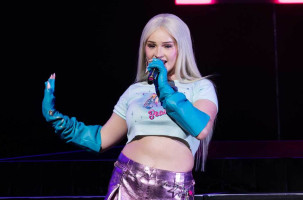In February, Japan’s Wagakki Band invited Evanescence's Amy Lee for a one-night-only concert called the "Premium Symphonic Night Vol.2" at Osaka-Jo Hall in Japan. Vocalist Yuko Suzuhana and guitarist Machiya spoke with Lee before the show and compared notes on their initial impressions of each other’s band and performances and shared their thoughts on collaborating, both onstage and in the studio.
The fruit of their collaboration, "Sakura Rising," is streaming now and Amy Lee comments, "This song is about unity, and hope. From opposite sides of the world we face the same problems, and we need to fight together instead of fighting each other."
Below is an excerpt from the long interview moderated by Billboard Japan, in which the three artists discuss their respective styles of music, ideas on collaborating, ways to break into the international music scene and more.
Billboard Japan: Amy, how did you find out about Waggaki Band and what was your impression when you first heard them?
Amy Lee: We're on the same record label, so I was introduced to their music by them. I became their fan right away, I thought it was fascinating and completely unique. Never heard anything like it. And in a weird way it reminded me of myself. So yeah, I just loved it right away.
What do you think is the difference between them and other bands?
Lee: There’s a lot of things. Let me start off with, they have a lot of members. (Laughs) That’s number one. Number two, the fact that they use ancient traditional Asian instruments is. I’ve never heard that before, and it doesn’t feel forced. It works, it sounds very natural, and huge. I’m obviously a big fan of a large sound, and their sound is just this big, beautiful. I don’t know, it’s like they have their own orchestra. Even without an orchestra now they’re playing with an orchestra, but it’s like that, it’s just a very big, unique sound, I love it.
You met at an Evanescence concert overseas, right?
Machiya: I think it was July 2018. Evanescence was touring with an orchestra. Amy described us as having a "large sound," and that was exactly what we saw then. Heavy, rocking, and beautifully blended with classical music. I felt something very close to our own current collaboration with an orchestra.
Amy, could you share what you wanted to achieve through your collaboration with Wagakki Band?
Lee: I really like to put myself in situations that are sort of uncomfortable and unfamiliar when I write. We all have our familiar places that feel like the safe place, like we always go, like me sitting at the piano, or me sitting with a guitar player when writing.
But I found, especially over the past 10 years, that when I push myself into a different place, work with somebody who’s different than my music, or have my entire band come in a circle and have everybody try to just jam and play music at the same time, it creates for different energies and makes different colors on the spectrum. And it helps you learn things about yourself that you didn’t know before.
There are all kinds of styles of music that I love, so it’s fun to have an opportunity to be in a little bit of a different world and let a different color shine maybe that I don’t always get to shine. So I was saying different recipes make for different outcomes, so I don’t know what it’ll be like, but that’s why it’s exciting.
Yuko Suzuhana: There’s something I want to try right now. I want to see what it would sound like to overlap a Japanese scale in my shigin (traditional way of reciting poetry as a performance) voice with Amy’s relaxed high notes. We [the band] rarely write songs in a session, so I’m really looking forward to it.
Can we expect some collaborative releases from this upcoming session sometime in the future?
Lee: Hope so. No pressure. (Knocks on wood.) I’m usually advertising before it’s written, but hey. I’m a little bit jet-lagged. I woke up at 5:30 a.m. with an idea. So from 5:30 to 6:30 I was recording my idea in my phone so that we can work on it later, so I’m excited about it. I have a piece of a song to bring to the table.
Amy, you probably get to hear local music in the countries that you travel to on tour. Could you share what you think is the distinctively Japanese elements that you find in Wagakki Band’s music?
Lee: Yesterday at the rehearsal was the first time I’ve heard anything of them live, and I was very impressed by Yuko’s voice. It’s unique in that I’m not really familiar with what she’s talking about, with the shigin. I’ve heard that before, but certainly never applied it to contemporary music. But it was really interesting to hear it with that big wall of sound, be so strong going through. Yuko’s voice is very strong.
One of the important things about being female, especially in a rock band, is having the focus and projection, to be able to have your voice exist on top of the music and not get lost in it. Her voice was really precise and strong and beautiful above the music in that room.
In terms of listening environment, it’s probably a lot easier now to find music from Japan from another country. What advice would you give a group like Wagakki Band for them to break into the international market and be accepted?
Lee: Gosh, that’s tough. (Laughs) I don’t know, you just gotta go! It’s interesting, because I would think that having a band with such a big production as yours, it’s quite an undertaking to put a show together. It’s expensive, it’s a lot of people. And I understand that, because we only have five members but it’s a lot of sound, there’s a lot going on. It requires some doing to go somewhere. So it can be difficult to travel far away, especially when you don’t have a big audience like you have at home yet. But I think the best advice is really just to go.
I think there is a market for your music in the world, because it is so unique. It doesn’t blend in, it doesn’t sound like anything else. Even my friends that I’ve been bragging about this performance, showing them your music, are always impressed and interested in it and would like to see it. So maybe just take a chance!
The fact that we are able to find music on the internet is awesome. That’s a big part of the battle. Before we ever got signed, when I was in high school, I remember some radio station in Canada found us for some reason and we had this small Canadian following. I thought that was so cool. I think part of that is just word of mouth. So the fact that it exists in a place where people can find it is great stuff.
Suzuhana: People discovered our music online, so I can really relate to that. When I see comments from all over the world on YouTube, I think there are still ways to take better advantage of that to open doors.
In the past, the common understanding was that if Japanese artists wanted to succeed abroad, they had to sing in English.
Machiya: When we first performed outside of Japan, we really wondered how we should approach that.
Lee: I don’t think that’s true anymore. We have several bands that are from Asian countries that have been very popular in the U.S. recently. There’s BABYMETAL and BTS. I know those are different styles of music, but the fact that they’re being embraced so much by American culture, I think is a good sign. I think the world is becoming more globally aware and open-minded.
We hope this collaboration leads to a joint tour someday.
Machiya: I’d love that. A world tour for sure.
Lee: I think I would be opening for you (in Japan), and maybe the other way around in the U.S.!








